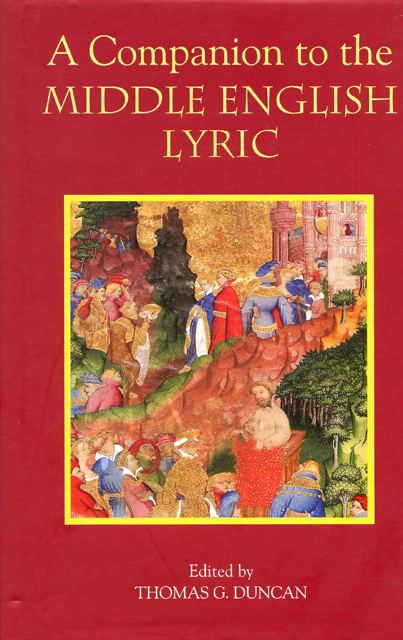Book contents
- Frontmatter
- Contents
- Acknowledgements
- Abbreviations
- Editorial Note
- Introduction
- 1 Middle English Lyrics and Manuscripts
- 2 Middle English Lyrics: Metre and Editorial Practice
- 3 The Love Lyric before Chaucer
- 4 Moral and Penitential Lyrics
- 5 Middle English Religious Lyrics
- 6 Middle English Courtly Lyrics: Chaucer to Henry VIII
- 7 The Middle English Carol
- 8 Political Lyrics
- 9 The Lyric in the Sermon
- 10 ‘Cuius Contrarium’: Middle English Popular Lyrics
- 11 Gender and Voice in Middle English Religious Lyrics
- 12 Lyrics in Middle Scots
- Bibliography of works cited
- Index of Manuscripts Cited
- General Index
- Index of Lyrics
Introduction
Published online by Cambridge University Press: 23 March 2023
- Frontmatter
- Contents
- Acknowledgements
- Abbreviations
- Editorial Note
- Introduction
- 1 Middle English Lyrics and Manuscripts
- 2 Middle English Lyrics: Metre and Editorial Practice
- 3 The Love Lyric before Chaucer
- 4 Moral and Penitential Lyrics
- 5 Middle English Religious Lyrics
- 6 Middle English Courtly Lyrics: Chaucer to Henry VIII
- 7 The Middle English Carol
- 8 Political Lyrics
- 9 The Lyric in the Sermon
- 10 ‘Cuius Contrarium’: Middle English Popular Lyrics
- 11 Gender and Voice in Middle English Religious Lyrics
- 12 Lyrics in Middle Scots
- Bibliography of works cited
- Index of Manuscripts Cited
- General Index
- Index of Lyrics
Summary
In the history of English literature, the emergence of the Middle English lyric is an event of considerable significance on several counts. One is a matter of poetic form. Readers of short poems in English from Chaucer to the present day might be tempted to think that such poems had always been written in stanza form. This, of course, is not the case. Only in early Middle English, less than two centuries before Chaucer, did poems structured in sequences of verse units each having the same number of lines, matching in length and marked out by a scheme of rhymes, make their appearance in English literature. Prior to the twelfth century, poems in English, short or long, had been written in one and the same verse form, the Old English alliterative line, a line divided into two parts, each of two stresses, with the stressed words of each part linked by alliteration. Rhyme scheme and stanza form alike were unknown to Old English literature. Only in Middle English did stanzaic verse form emerge – a striking innovation derived from and modelled on stanzaic lyrics in Old French and Medieval Latin literature.
Along with this new verse form there appeared an equally novel feature in the content of Middle English secular love lyrics: here, for the first time in English literature, poets write of love in terms of absolute devotion and service to a lady. The poet suffers in his love-longing for his lady; his life is wholly dependent on her; he beseeches her to have mercy on him; he pledges his life-long loyalty to her; her love is the only remedy for his distress. This mode of love-longing was unlike anything hitherto encountered in English poetry. Occasionally a cry of love was heard in Old English, as in the following lines translated from the enigmatic poem Wulf and Eadwacer:
Wulf, O my Wulf, my yearning for you
Has made me ill, the rareness of your visits,
My sorrowing spirit, not a lack of food. (13–15)
Here, however, the speaker is not a man but a woman. In the heroic world of Old English poetry a man's concern centred on his duty to his lord; his ruling values were those of loyalty and courage. Love as devotion to a lady was as yet unknown as an ideal let alone as an all-consuming passion.
- Type
- Chapter
- Information
- A Companion to the Middle English Lyric , pp. xiii - xxviPublisher: Boydell & BrewerPrint publication year: 2005



